-
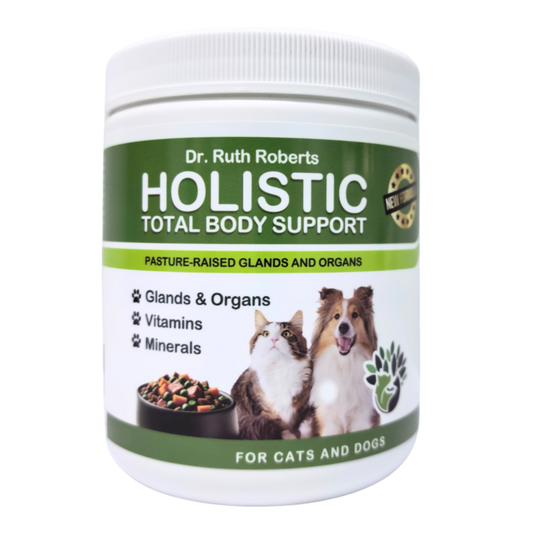
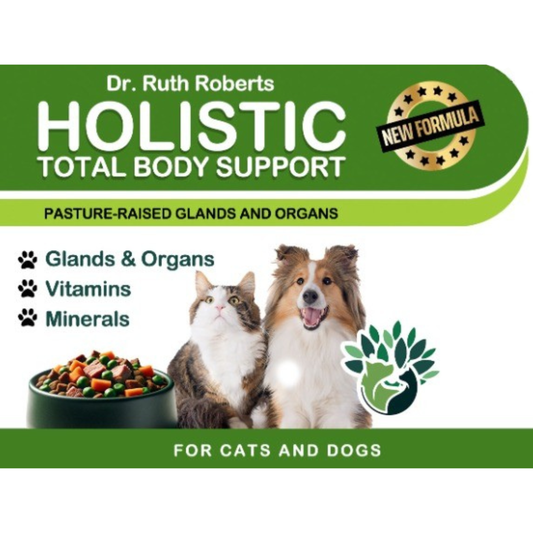
Holistic Total Body Support – Multivitamin & Glandular Support for Dogs and Cats
Holistic Total Body Support – Multivitamin & Glandular Support for Dogs and Cats
Vendor:Dr. Ruth Roberts(42)Regular price $64.00 USDRegular priceUnit price per$64.00 USDSale price $64.00 USD*NEW FORMULAHolistic Total Body Support formulated by Dr. Ruth Roberts is a daily multivitamin for dogs and cats, designed to complement a variety of feeding routines—including home-cooked diet. This powdered blend provides a wide range of essential vitamins, minerals, amino acids, and organ-based ingredients (known as glandular supplement), including calcium citrate for dogs and cats as part of its balanced formula. This versatile multivitamin is often selected by pet parents seeking a nutri...
-
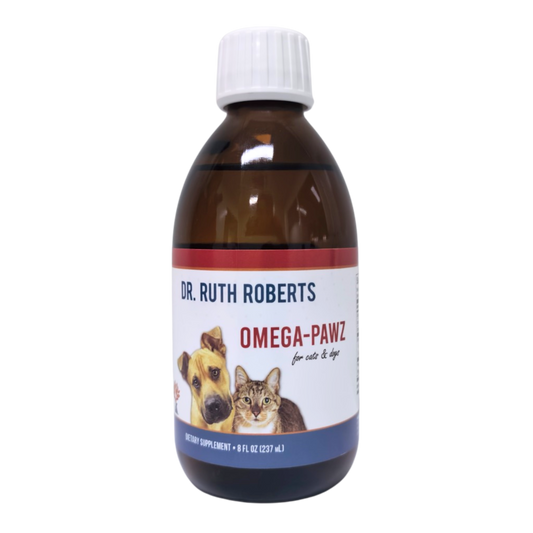
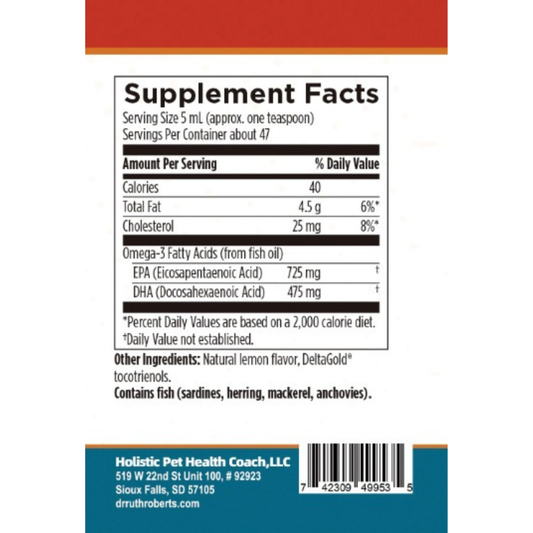
Omega Pawz - Liquid Omega 3 Oil for Dogs and Cats
Omega Pawz - Liquid Omega 3 Oil for Dogs and Cats
Vendor:Dr. Ruth Roberts(42)Regular price $39.00 USDRegular priceUnit price perOmega Pawz by Dr. Ruth Roberts is a liquid omega 3 oil for dogs and cats, thoughtfully made with quality fish oil to complement your pet’s daily feeding routine. This easy-to-use formula includes EPA and DHA, two well-known omega-3 fatty acids found in marine sources. Whether you're looking for omega 3 oil for dogs to include as part of a regular rotation or exploring omega 3 oil for cats for variety in their diet, Omega Pawz offers a simple, pet-friendly option. The light lemon flavor helps ...
-


MegaSporeBiotic™ - Probiotic Supplement for Dogs and Cats
MegaSporeBiotic™ - Probiotic Supplement for Dogs and Cats
Vendor:Microbiome Labs(42)Regular price $64.95 USDRegular priceUnit price perMegaSporeBiotic contains a blend of five spore-forming Bacillus strains. These spore-based Probiotics are naturally resistant to stomach acid, which may help them reach the intestines, where they can support the balance of gut bacteria. The spore-based formula may help maintain microbial diversity in the gut, which plays an important role in overall health. This supplement does not require refrigeration, making it a convenient option for daily use. Usage Information: It is recommended to cons...
-
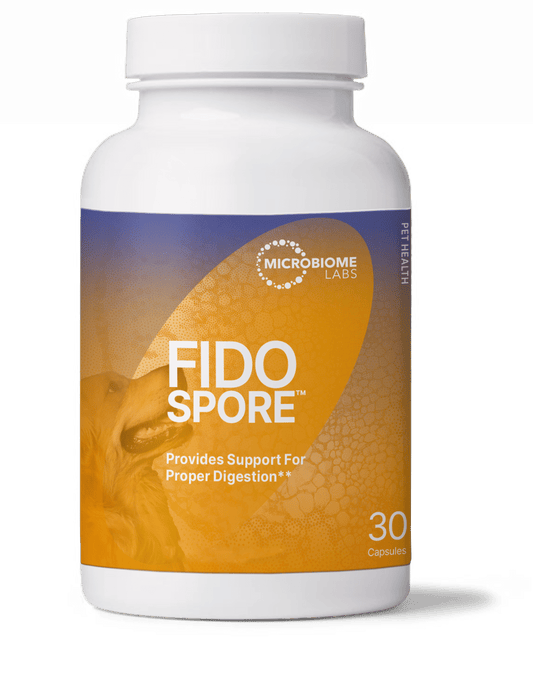

Fidospore by MicroBiome Labs
Fidospore by MicroBiome Labs
Vendor:Microbiome Labs(42)Regular price $44.87 USDRegular priceUnit price per$44.87 USDSale price $44.87 USDFidoSpore™ features a combination of carefully selected probiotic strains, including Bacillus subtilis HU58, Bacillus licheniformis (SL-307), and Pediococcus acidilactici. These spore-forming and lactic acid-producing bacteria are commonly used in pet nutrition and are known for their stability and resilience in various environments. The formula is enhanced with defatted, grass-fed beef liver to offer a savory aroma and flavor that many dogs enjoy. FidoSpore™ can be added to your dog’s daily ...
-
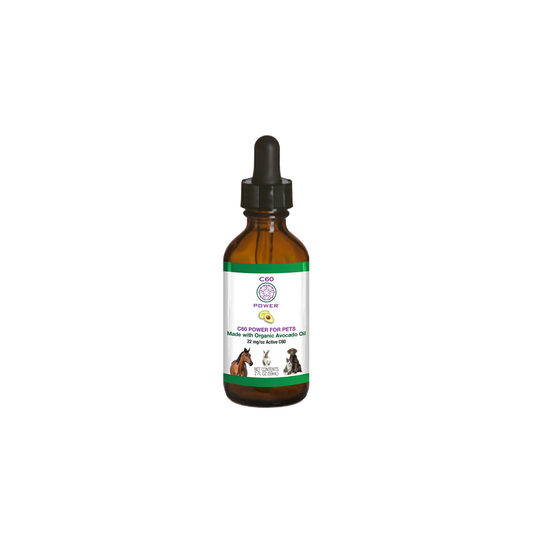

C60 Purple Power - Antioxidant with Organic Avocado Oil (59ml)
C60 Purple Power - Antioxidant with Organic Avocado Oil (59ml)
Vendor:C60 Purple Power(42)Regular price $60.00 USDRegular priceUnit price perGive your pet the gift of optimal health with C60 antioxidant oil!Made with 100% organic cold-pressed avocado oil, this supplement delivers top-tier quality and powerful support for your pet’s well-being. Rich in antioxidants, C60 helps protect your pet’s body from harmful free radicals—reducing the risk of age-related diseases and supporting a longer, healthier life. Perfect for pets of all ages and sizes, it’s especially helpful for those dealing with joint pain, allergies, or chronic healt...
-


The Original Crockpet Diet™ Ebook and Recipes
The Original Crockpet Diet™ Ebook and Recipes
Vendor:Dr. Ruth's Courses(42)Regular price $49.00 USDRegular priceUnit price per$97.00 USDSale price $49.00 USDIgnite the Chef in You for a Healthier, Happier Pet Are you tired of commercial pet food options that leave you guessing about what's really in your fur baby's bowl? Take control of your pet's nutrition with our comprehensive self-paced course! What You'll Learn🌟 TOCPD Cooking Essentials: Master the art of crafting balanced, nutritious homemade meals for your pets. Discover rotation diet templates tailored for both cats and dogs, ensuring a well-rounded diet. 🐶 TOCPD For Dogs: From succulent...
Sale -
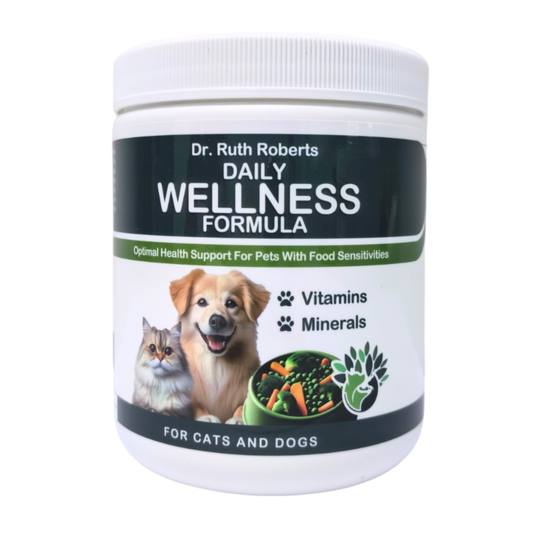

Pet's Daily Wellness Formula - For Pets With Pork/Beef Allergy
Pet's Daily Wellness Formula - For Pets With Pork/Beef Allergy
Vendor:Dr. Ruth Roberts(42)Regular price $54.00 USDRegular priceUnit price per$128.00 USDSale price $54.00 USDPet’s Daily Wellness Formula formulated by Dr. Ruth Roberts is a thoughtfully crafted multivitamin for dogs and cats, designed as a convenient daily addition to your pet’s feeding routine. This formula contains a full spectrum of vitamins, minerals, amino acids, and naturally sourced ingredients—including calcium carbonate for dogs—to help fill common nutritional gaps. It’s especially well-suited for pets with dietary sensitivities, as it’s free of glandular ingredients like beef or pork orga...
Sale
LET'S LEARN MORE ABOUT
Respiratory Disease in Dogs
Common Causes of Respiratory Issues in Dogs
Common Symptoms of Respiratory Issues in Dogs
Natural Support for Your Pet’s Respiratory Health
Talk to Us
If you need help with starting up the course or getting access to the recipes and videos, please don't hesitate to contact us via call/text at +213 394 2923 / email drruthroberts@drruthroberts.com.
















